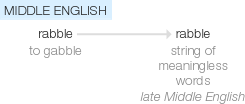Rabble
late Middle English (in the senses ‘string of meaningless words’ and ‘pack of animals’): perhaps related to dialect rabble ‘to gabble’.
wiktionary
First attested since 1300s, from Middle English rablen(“to ramble; rave; speak in a confused manner”), cognate with Middle Dutch rabbelen(“to talk; chatter; trifle”), Low German rabbeln, robbeln(“to chatter; prattle”).
From Middle English rabel, probably from the verb (see above).
Old French roable (modern French râble), from Latin rutabulum(“a poker”).
etymonline
rabble (n.1)
c. 1300, "pack of animals" (a sense now obsolete), of uncertain origin, but possibly related to Middle English rablen "to gabble, speak in a rapid, confused manner" (mid-14c.), which is probably imitative of hurry, noise, and confusion (compare Middle Dutch rabbelen, Low German rabbeln "to chatter").
The meaning "tumultuous crowd of vulgar, noisy people" is from late 14c., probably a back-formation from the Middle English verb. It was applied contemptuously to the common or low part of any populace, regardless of tumult, by 1550s.
rabble (n.2)
"iron bar, bent at right angles at one end, for stirring molten metal," 1864, from French râble, from Old French roable, from Latin rutabulum "rake, fire shovel" (in Medieval Latin also rotabulum), from ruere "to churn or plow up, dig out," (from PIE *reuo-, source also of Sanskrit ravisam, ravat "to wound, hurt;" Lithuanian ráuti "to tear out, pull," ravėti "to weed;" Russian ryt'i, roju "to dig," Old Church Slavonic rylo "spade," Old Norse ryja "to tear out wool," German roden "to root out").
